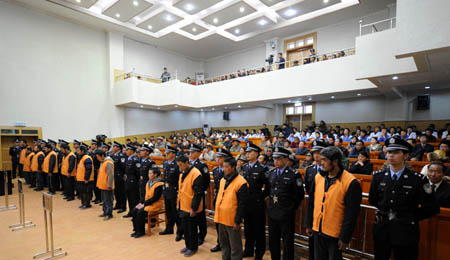Rioters in Lhasa unrest receive fair trial
(Xinhua)
Updated: 2008-05-02 11:20
Updated: 2008-05-02 11:20
LHASA -- Thirty people who were jailed for their involvement in the March 14 riot in Lhasa, Tibet, have received fair trials, lawyers and judges said on Thursday.
Three were sentenced to life and the others received terms ranging from three to 15 years, according to the Intermediate People's Court of Lhasa, which passed down the sentences at a public court session on Tuesday in the autonomous region.
|
|
They were convicted of arson, robbery, creating disturbance, assembling to assault state organs, preventing state personnel from carrying out their functions and theft. The riot killed 18 civilians and one police officer and injured hundreds of others. The total property damage was more than 280 million yuan (US$40 million).
The trials from April 21 to 25 for the 30 suspects strictly followed the Criminal Law of the People's Republic of China and the Criminal Procedure Law of the People's Republic of China, said Cao Qing'an, Lhasa Intermediate People's Court vice president, in an interview with Xinhua.
Cases for 29 defendants were heard in public, while the other involved a minor who could not be identified.
"We fully supported the defence lawyers to consult the materials of the criminal facts and meet the defendants in custody," said Cao.
In the following proceedings, the defendants could hire their own lawyers. The court would also designate lawyers for those who could not afford to be defended.
"The defendant Yexe told me that the police did not extort or torture him for a confession. His jail term was shorter than I expected," said lawyer Sun Wenge.
Yexe, 23, assaulted stores and restaurants and stoned police at the gate of the Public Security Bureau of Linzhou County on March 15. He also incited others to set fire to a vehicle, the court heard.
He was convicted of creating disturbance and assembling to assault state organs.
"He would have faced a jail term of up to 15 years, but as he surrendered himself, the court adopted my opinions and shortened the term (to 12 years)," Sun said.
The chief justice and the court clerks were all native Tibetans, while only six of the 28 judges were Han Chinese, said Gaisang Doje, deputy head of the criminal tribunal of the court.
The proceedings were conducted in Tibetan. The court also provided translations among the defendants and the Chinese judges and lawyers.
All the fees for translation and lawyers during the proceedings were paid by the regional center for legal aid.
According to the law, the 30 accused can appeal to the Higher People's Court of the Tibet Autonomous Region within 10 days.
|
||
|
||
|
|
|
|
